Behind creativity: An interview with Marcos Perez Briñez , a amazing redactor/journalist
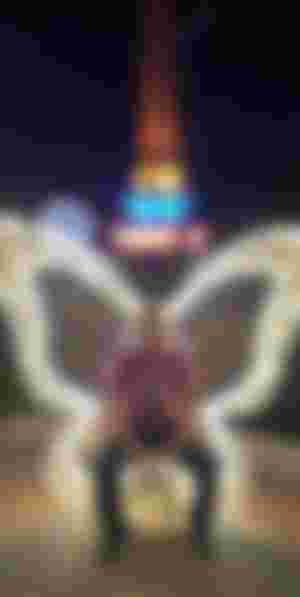
Welcome everyone!
Today I have the pleasure of introducing an interview with Marcos Perez Briñez (@otherman in hive), a Venezuelan artist, writer, architect, and interesting person in general.
Getting to know Marcos Perez Briñez and his journey
This man is about to take a big step by sharing his talents on Hive, our beloved blockchain. In this interview, you will learn more about his artistic inspiration, creative process, and experience in architecture and writing.
Marcos is a talented and experienced individual in multiple disciplines, including plastic arts, writing, and architecture. Despite his vast experience, he has not yet started publishing on Hive.
In order to help him become known in this environment, we agreed to conduct an interview before he publishes his content. This interview will provide the entire community with an opportunity to become familiar with Marcos, learn about his artistic inspiration, creative process, and experience in architecture and writing. Additionally, it will allow Marcos to share his goals and aspirations with all of you.
You will discover why he decided to join the Hive community and what he hopes to achieve by sharing his work here.
This is a unique opportunity to get to know a talented and experienced individual and learn from his expertise in multiple disciplines.
So, without further ado, I invite you to keep reading and join this exciting journey towards his Hive adventure.
How did you get started in the world of blogging and content writing?
Good afternoon, Reinaldo!
About ten years ago, I started as a content writer with a friend who currently lives in Malta. He and I are from Maracaibo, and we have been friends for a long time. He teamed up with another person to set up a content marketing agency in Caracas, which needed writers. Despite having no experience in the field, my friend contacted me and suggested that I write for them.
I don't know exactly why, but he thinks I have a fairly broad general knowledge, information on many topics, and I like research, culture, reading, movies, theater, music concerts, in short, a more or less broad culture.
I accepted the offer and contacted the company manager, who was a journalist in Caracas. I started as a writer for Clean Perception, and I really liked it. We got along well and then they invited me to Caracas, where I went as editor to raise a position. It was there where it all began.
I have worked two, three, four times with my friend and in other Argentine and Spanish companies and for a Mexican news page, where I was a researcher, editor, writer, and I they went through video selection and almost every charge there was. However, they decided they really liked my work as a copywriter and left me in that position.
There was a time when I was writing and editing, which created a conflict of interest, since I couldn't edit my own texts. If I was in charge of writing, I couldn't edit my own texts, and if I edited someone else's texts, I couldn't edit my own texts. Despite this, I continued to work in the field.
It's been ten years since I started working as a content writer, and I just finished a job with Windows Ltd, a marketing agency that is opening many roads in Europe and is based in Malta.
How do you define your writing style and what inspires you when creating content?
In general, I like to share the information I have and give it a different character. That is, look for aspects that are not well known and that are news that capture the attention of the reader.
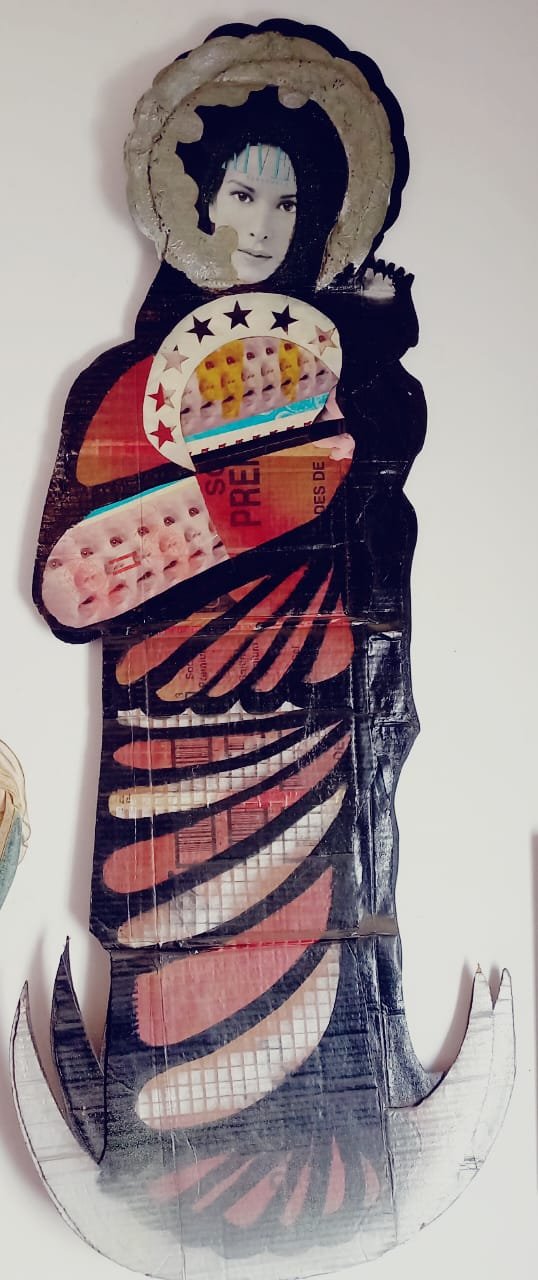
La Excelsa - collage on corrugated cardboard, various materials. Participated in the 1st Cultural Hall of the Western Discount Bank in Maracaibo
Do you think censorship is justifiable in some cases in the world of art and literature?
In my opinion, it is necessary to speak clearly and directly on all topics, without justifying them in any way. I believe that censorship is not the solution, although I understand that some media may have restricted criteria or a not very open mind.
In these cases, I think it's best to talk to the person who created the content and try to reach an agreement to make it more moderate. But I never agree with censorship.
How have you managed to keep your audience interested in your content over time?
I don't have any magical secrets, I just follow my instincts. I am real and honest in the sense that it is very difficult for me to deal with topics that are not to my liking. For example, I have no knowledge of sports at all, so I try to avoid talking about it. However, in my last job with the marketing agency Blue Window in Malta, I was assigned to subjects of sports, tennis, football, horse riding, cycling, among others. Despite not being my area of interest, I tried to be as professional as possible by giving consistent and true information.
In my opinion, there is a bad habit and a tendency among people who write on the internet to invent, tell lies, exaggerate things and misrepresent information. I do not agree with that. I think it's important to be honest with the reader and give true and proven information. If I have to research a topic, I take the time necessary to conclude the information accurately.
In particular, there are sensitive issues such as health, in which it is essential to be rigorous and not spread false information. I don't like influencers because in my experience, many of them are not what they say they are. I have worked at a news company and have researched health influencers that turned out to be fake. They did not have the kind of life they ensured and promoted unhealthy habits. In my opinion, it is important not to mislead the reader and be consistent with what is promoted.
In short, I believe that the secret to writing good content is to be honest, rigorous and coherent with what is said. It is not about inventing or exaggerating, but about offering relevant and truthful information for readers.
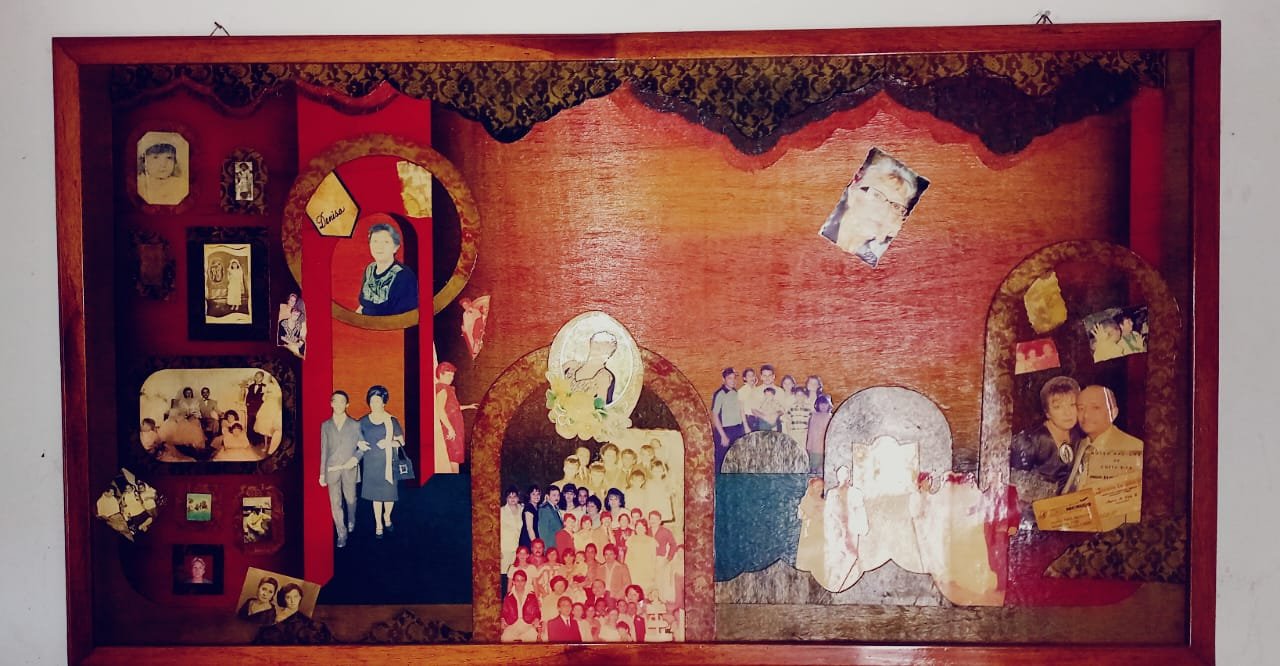
What advice would you give to someone who wants to start blogging?
For me, keeping an eye on all media has been very useful. I don't just search for information on Google or the Internet, but I also watch TV, listen to the radio, and go to the movies. I take inspiration and models from different places.
In the Mexican page where I worked, I learned something that I consider very important for those who want to start or are already writing and writing. The news or the subject of the content will always be the same. For example, if a train accident occurs, the news will always be that the train crashed and there were a certain number of injuries and deaths. What changes is the approach you give to the content. If you repeat the same thing as other media, people will lose interest. Therefore, it is essential to give a different point of view and an approach that draws the reader's attention.
For example, if you are in a ten-story building when the train accident occurs, your perspective is different to that of someone who is at the train station or on a nearby sidewalk. The perspective you have can make your content more interesting and appealing to readers.
Another important thing to keep in mind is the image. Many times, people take the first image they find on Google or unlicensed image search engines. However, the image is vital to attract the attention of the reader. As they say, a picture is worth a thousand words. For this reason, it is important to look for an image that is compelling and that draws the reader's attention.
The title is also essential to attract the reader. It should be short but engaging, and it should sum up the whole story. For example, in the case of the train accident, "Fatal Accident" might be an attention-grabbing title. You can also add a subtitle that complements the information and generates curiosity in the reader.
In summary, to write good content it is essential to have a different approach from other media, use attractive images and look for titles short but striking. In this way, you can capture the attention of the reader and generate interest in the content.

What are the biggest challenges you have faced as a content writer and how have you overcome them?
Currently, thousands and thousands of pieces of information are generated on the Internet every second, which makes it difficult for search engines like Google to take into account everything that is published. For this reason, it is essential that the content that is shared is original and has a vision or aspect that most people are unaware of.
For example, if you are a blogger named Reinaldo, instead of talking about the common topics that are covered in your blog, you could look for a part of you that people do not know. For example, if you like trekking, walking or going up Avila, you could share that aspect of your life that few know about. You could also talk about your love for animals, such as your passion for cats.
In order for your content to stand out from the mass of information being shared on the Internet, it is important to link the topic with something relevant and original, and look for aspects of your life that people don't know about.
How do you handle the representation of sensitive topics such as violence or abuse in your works or content?
The public's morbidity for sensitive and violent topics, such as rape and violent deaths, has changed . It's about softening it somehow. An example of this is that instead of showing images of women stabbed or shot in cases of feminicide in Mexico, where unfortunately many violent deaths of women occur daily, more subtle images are sought.
In my work as a content creator, I have found it important to find a balance between gaining public attention and being sensitive to sensitive and violent topics. Looking for images that suggest violence without being explicit can help soften the public's morbidity about these subjects.
Instead of showing explicit images of violence, look for an image that suggests violent death, but showing no blood or wounds. For example, a woman's hand with painted nails can be shown sticking out from under a cloth that covers it. In this way, an image is achieved that suggests violence, but is not so grotesque.
This is especially important if the image is going to be used on a cover or in a prominent position. If the image is too explicit, it can be grotesque and unpleasant for many people.
It's important to find a balance between gaining public attention and being sensitive to sensitive and violent topics. Looking for images that suggest violence without being explicit can help soften the morbidity that the public feels about these subjects.
What is a typical day in your life like as a content writer and artist?
The artistic part of my job is not something I do on a daily basis. Actually, I am maturing the ideas and themes in my mind, as well as the elements that I am going to use in my artistic works, like the images in a collage or the elements in an assemblage.
I'm not used to making sketches, although I do do some with respect to exact measurements or shapes if necessary. But in general, I create the sketches in my mind and mature them until I have a clear idea of what I want to do. Once I have everything planned, I get to work on the site.
Right now, for example, I have a work in progress about Pasolini, the Italian film director who was assassinated in Rome. Generally, when it comes to a blog or a post, marketing agencies assign me a specific topic and send me between one and twenty proposals a week for me to work on.
I like to work early in the morning, at three, four or five, because everything is calm and my mind is fresh. After noon, it's harder for me to write because I'm already exhausted from the day's tasks. For this reason, I try to take advantage of the first hours of the morning to work on my projects.
My creative process is something that matures in my mind before I get to work on an artistic work. I prefer to work early in the morning when my mind is cool and calm.
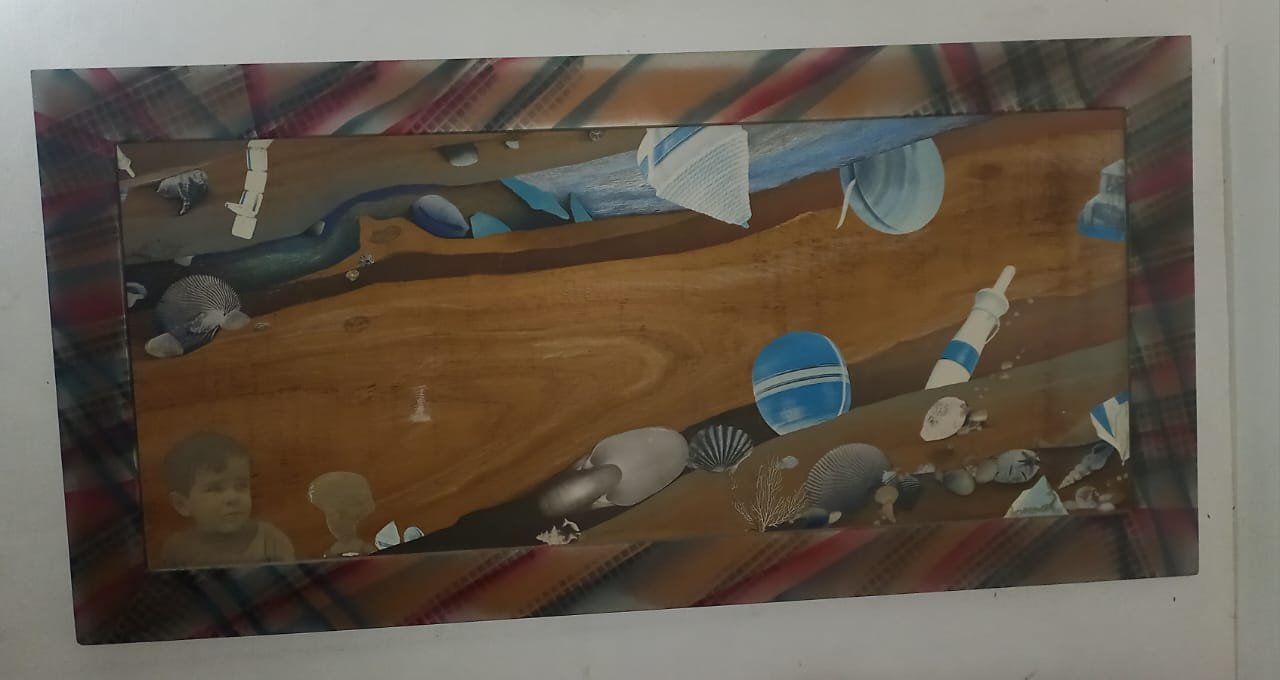
How do you create a connection with your audience and what techniques do you use to achieve it?
I don't really have a direct connection to my audience because I don't do live streaming, I don't have a YouTube channel or YouTube account. My content is mostly text based, but I try to match people's interest in the moment.
Depending on the topic I'm working on, I look for information outside of Google because the same information is often repeated in search engines. For example, on national or cable television shows, sometimes detailed information is provided that cannot be found on Google or other search engines. I also talk to people who are up-to-date on certain topics, such as a cousin who is a proctologist and can provide me with information on the latest treatments or medications that are available.
If it's a comment about a movie star or celebrity, I look up the person's bio or their official website to see what's new they've done. In general, I try to look for reliable and up-to-date sources to provide the best possible content.
Although I don't have a direct connection with my audience, I try to provide interesting and up-to-date content, searching for information outside of traditional search engines and consulting with experts on different topics.
What has been your most challenging project so far and how have you dealt with it?
About eight years ago, I started a project to raise the reputation of some politicians who were very discredited. The idea was to carry out surveys to find out their tastes, preferences and predilections in different topics, such as sports, music, cinema, art, among others. Then, he dedicated an article to each of his interests to try to improve his image.
For example, there was a politician who was a fan of eagles, so I told him about the bald eagle and the Zulia eagles in baseball, he even adopted this team because he liked anything to do with eagles. In this way, I tried to clean up the image of him and position him in areas that were not related to politics.
However, these political figures were very corrupt and every time a scandal broke, they would throw up a smokescreen talking about other issues that were of interest to them. Therefore, it was not easy to achieve our goal, but we managed to improve its image.
My project consisted of raising the reputation of political figures through articles about their interests in different areas. Although it was a challenge due to the corruption and scandals they were involved in, we managed to improve their image.
Do you think gender identity and sexual diversity should be recurring themes in contemporary literature and art?
I think it's important to address hot, topical issues like transgender, but you need to be careful how you approach the topic. Personally, it bothers me when it's treated in a sensational way.
For the content to have credibility, it is important that it is serious and based on reliable sources. For example, I usually use literal and verbatim phrases from well-known people on the subject, such as transgenders who have some recognition in society, such as congresswoman Tamara from Caracas. In this way, solidity and a good base are given to the text.
It is important to highlight the merits and values of people, regardless of their sexual orientation or gender identity. However, talking about someone who is not known or recognized can raise doubts about the credibility of the content.

How do you keep up-to-date with regards to trends and news in your niche market?
When I look for information in the press or on television, I try to find reliable and recognized media. For example, the BBC is a world-renowned medium, yet many people claim that they are communists. Personally, I don't believe these claims unless the formation is tight and subliminally to the left.
In the past, I worked with the net in Mexico and although their formation was closed and subliminally to the left, I did my job as they wanted because they paid me for it.
It is important to look for reliable means to obtain information and form your own opinion. Although there are opinions or rumors about the political orientation of some media, it is necessary to analyze its content critically and objectively to form your own opinion.
What is the process you follow to create content from idea to publication?
When I write an article, if the topic is chosen by me, then I look for the title that best defines it. If the topic is assigned to me, they usually suggest a title. In both cases, I start by defining the title and image.
The title can change as I write the post, since I like to take a phrase that is inside the post for the title. The image is vital for me, since it can give me ideas and make me change my point of view. It is important that the image is forceful, attractive and attracts attention.
After the image, comes the title that must be attractive enough for the reader to want to read and develop the topic itself.
To write a good article it is important to define the title and image from the beginning. The title may vary as the post is written, but it should always be attractive and appealing to the reader. The image is vital to contribute ideas and change the point of view.
How do you handle the pressure and stress of meeting deadlines and delivering content?
Personally, I try not to take jobs that are too close or conflicting, as they stress me out and I don't usually do a good job when I don't take my time. Although I can be fast in my work, like when I had to publish 20 news a day with a Mexican, I don't like stress because it doesn't help me to organize my ideas well.
When I was working with this Mexican, my job was to change the title of the news, add an image and some additional details. Although it was fast, I didn't like the stress it generated.
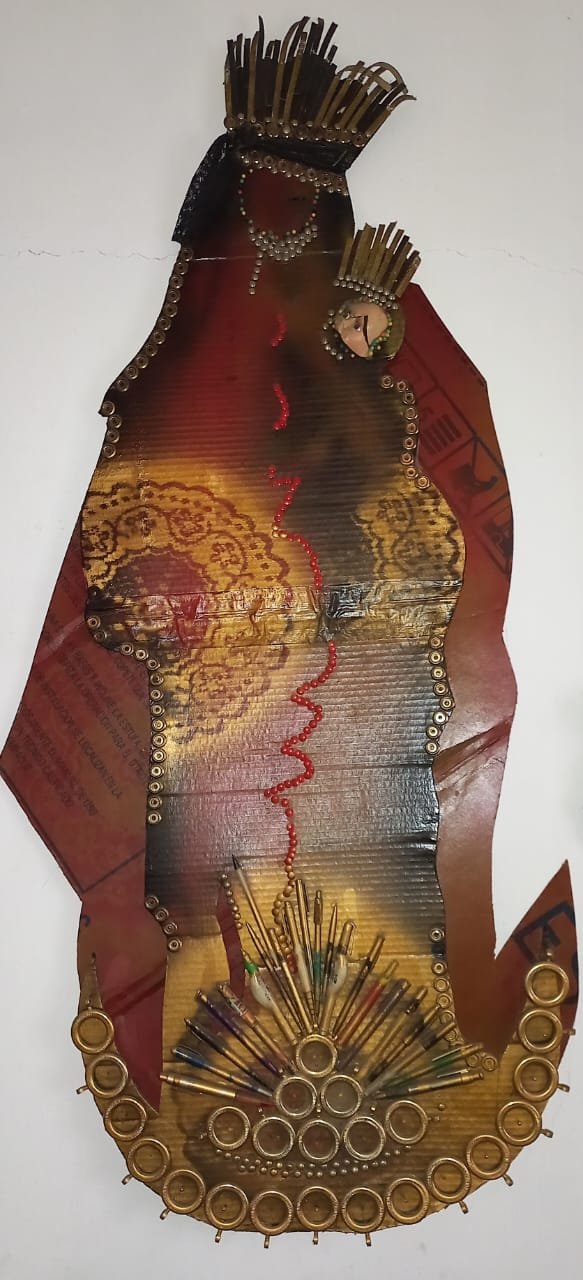
How do you differ from other bloggers or content writers in your niche?
In my opinion, the topics that are covered in the media should not be the same mediocrity or stupidity that you see a lot today. Social networks have positioned many people who do not have criteria, who do not know how to speak or write properly and who do not know how to issue a coherent opinion.
It's not that I want to give it to me for nothing, but it's important that things be taken seriously and not talk stupid things to fill content or to make a bad scandal that doesn't contribute anything.
What do you think about the future of content writing and blogging?
The vast majority of visual artists I know do not consider social media as an important tool for sharing interesting or relevant information. Instead, they are dedicated to selling and producing works, without offering additional content.
On some social networks, such as Instagram, some artists simply post photos of their works with measurements and technical data, turning their profile into a virtual store, instead of sharing relevant and attractive information.
Personally, I don't like the idea of turning my profile into a virtual art store. When I post on Instagram, I do it to share things that aren't necessarily related to my artwork, like catalogs or exhibitions. I do not have a profile exclusively to sell my works.
In the entertainment industry, mercantilism and marketing are very important. When a new idea comes up for Netflix, Hollywood or any private studio, the first thing they think about is how to monetize the product. If it is a movie, for example, the music, costumes, accessories and anything that can be marketed are sold.
Unfortunately, more and more, everything is geared towards merchandise. For example, in Facebook videos, before you start viewing the information, there are non-skippable ads that interrupt the content. Although there is a "skip" button in the middle of the ad, it's hard to avoid seeing it. On YouTube, they offer a Premium version without advertising, but it is paid and it is not cheap.
How do you combine your facet as an artist with that of a content writer and blogger?
I try not to mix things up too much. Sometimes it can be convenient, for example when I'm in a group or solo show, to post a lot of content related to the creative process and how the work was achieved. However, I generally try to keep the various topics separate.
What is your opinion about the role of art and literature in today's society and how do you think they should contribute to solving social problems?
In my opinion, art in all its forms: literature, cinema, music, dance, among others, is as important as the economy and politics. Although art does not feed you or fill your stomach, it does nourish the soul and spirit, which is essential in an age convulsed by wars, changes, alarming news, and technologies.
Art is a haven of peace in the midst of chaos. It allows us to disconnect from reality and immerse ourselves in imaginary worlds, which can help us to better face the difficulties of everyday life. In addition, art allows us to express our feelings and emotions in creative ways, which can be very therapeutic.

What projects do you have in mind for the future and how do you hope to continue growing as a writer, visual artist and blogger?
As for the visual arts, I had a solo exhibition planned at the Maracaibo Art Center for this year. However, it has been postponed for two years due to the country's political and economic problems. The idea was that the exhibition would occupy the entire room, and the Art Center already has an archive of my previous works, so I was willing to create new works for the exhibition.
This exhibition is part of Marco Manos de Tijeras' Duchamp Salon award, but is currently on hiatus. The director of the Art Center, who is very young and talented in terms of assembly, does not have the experience of a curator, so it is not known when the exhibition will resume. In addition, the director is currently living in Spain.
As for my career as a blogger, I am looking for new ways to position myself and make myself known in other areas. The Malta project has been completed and I am now exploring other opportunities.
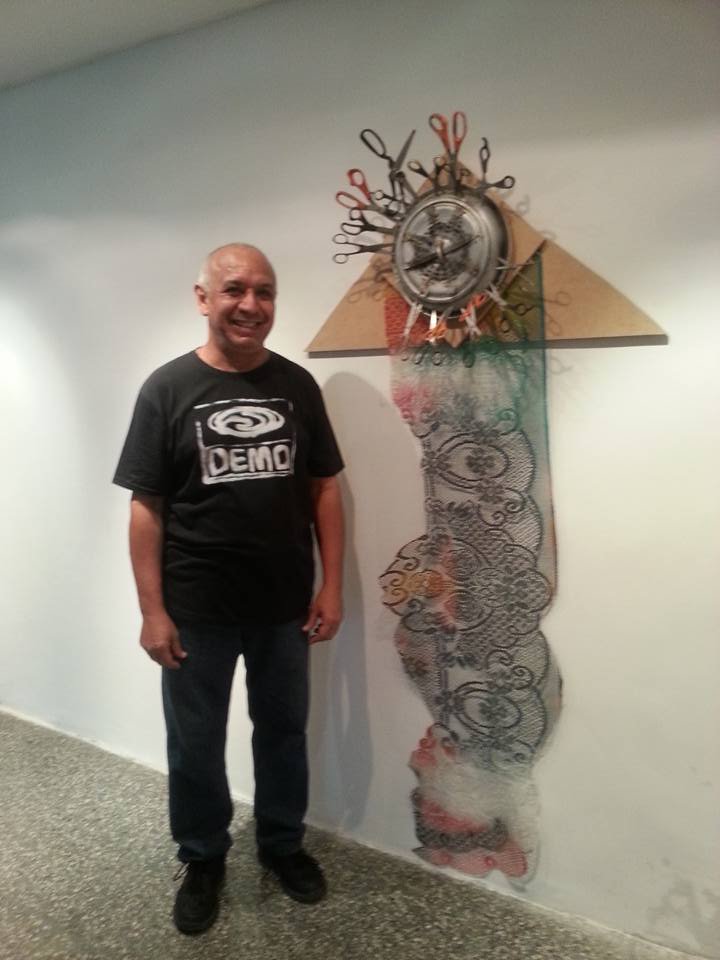
Any final message for your followers and the readers of this blog?
My recommendation to those who are in the world of journalism or starting out in it is to always be sincere and honest in your work. Personally, I do not agree with the use of falsehood, exaggeration or lies in the information that is shared.
I think it's important to be real and well documented before posting anything. If I'm going to write about someone, like Reinaldo, for example, I'm going to talk about him as he is, without making things up.
In my opinion, it's important to keep a positive attitude when writing about someone, even if it's not always possible. For example, when I had to research health influencers, I discovered that many of them were fake. Only two or three of them actually followed the healthy lifestyle that they recommended in their posts. Most of them were messes, not exercising or eating healthy.
While you don't have to be a detective to find the truth, it's important to do a lot of research before posting any information. In my case, I found photos of some influencers eating in unhealthy places, and I discovered that many of their posts were lies.

This was the conversation I had with him for a couple of hours, he is highly motivated to participate in Hive and this interview was conducted with the purpose of introducing him to the community and that soon he will begin to share with you all his content, his world, his feeling. I can truly attest that he is a very interesting person with endless creativity and love for what he does. He has also received several important awards and mentions in the art world.
Although this publication was originally published on hive, I have also uploaded it to read.cash because Marcos has let me know his interest in people from the Philippines and this community also knowing his work, so this is the reason why which appears here as well. Likewise, he will be reading each of his comments and as soon as possible he will give them an answer.
I hope you have enjoyed this interesting interview, that with it I reactivate my presence in hive after so long.
Leave your comment and opinion in the comment box, both Marcos and I will read it, and thanks for your visit.







Excelente entrevista y acertadas tus preguntas 🥰 el sr Marcos se nota su experiencia y por supuesto será bienvenido a Read.cash, espero leer sus articulos por acá. Me encantó la entrevista. Saludos de mi parte a tu amigo el Sr Marcos.